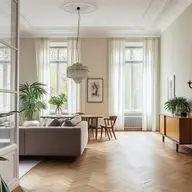
- 4 min read
- 15.03.2019
Adapting your residential property for commercial use
&w=1920&q=75)
Adapting residential property for commercial use is a tempting prospect. Alongside traditional demand for workspace, 50% of people work out-of-office at least 2.5 days per week: and they often need their own desk. Whether you're joining them or taking advantage of the growing market they provide, deciding to convert your residential property to commercial is a smart choice.
Can we use residential property for commercial use?
Most national and local governments want to encourage entrepreneurs, and you can plan without worry. However, they will have regulations you'll need to follow. In the UK for example, you only need permission from local (municipal) planning authorities for significant alterations, installing advertising or accepting lots of deliveries. You’ll also have to pay business rates (a business tax) if you use a large proportion of the property.
In Germany, however, converting the use of a property always requires a building permit from the local state. They are quite standardised across the country, but there are some exceptions. Notably Berlin, where residents are not permitted to change a property from residential to commercial use at all. So it's vital to check with your national and local authorities.
How to turn your property into a workplace
When you start your conversion, you'll need to plan for:
Health and safety
Disabled access
Sanitation
Technical equipment
Noise regulation
Rules regarding health, safety and disabled access are complex, and vary by country and state. Broadly speaking your property will have to be fire resistant, with sufficient and well-labelled fire exits, fire extinguishers and first aid equipment. In many countries, including Germany, businesses must also provide disabled access. Although some, such as France, are more lenient. Which is why it's crucial to check local requirements.
Tenants will also expect sufficient bathrooms, a kitchen space and their own phone and internet connections. If your property will be mixed use, you'll need to check with your utilities providers to see if they can provide separate billing or supplies.
Noise can also be an issue. In Germany, this is addressed at the planning stage and you're unlikely to break the general limit of 80db. In Spain or the UK, however, limits vary based on location, time of day and what you're doing. If there's likely to be a lot of noise, you may want to consider soundproofing. Padded rugs and carpets on upstairs floors will cut a lot of sound, as will sound-blocking doors and curtains, which can be easily installed.
Full conversion or mixed use?
Whether you'll convert the whole property or create a mixed-use development could depend on your target tenants. The rise of co-working spaces and flexible offices, where freelancers and entrepreneurs come and go, means the demand for office spaces is changing.
In this environment it's easier for you to market single desk spaces, and even live-work opportunities, on a short-term basis, to more people. Especially with P2P platforms like deskcamping.com. However, this must be weighed against the financial security of long-term leases and bigger clients a complete office conversion could provide.
Whatever you decide, remember that your first attempt isn’t your final one. It just means you can stop thinking ‘can we use residential property for commercial use?’ and start thinking ‘how can we use the space better?’ To answer that question, visit our office interior design blog.
You may also be interested in
 Floor plan: Everything important about planning, creation, and interpretation
Floor plan: Everything important about planning, creation, and interpretation Sustainability & ESG in Real Estate: What You need to know
Sustainability & ESG in Real Estate: What You need to know- 3 min.
- 30.04.2025
 Erding real estate market 2026: Market overview and price developments
Erding real estate market 2026: Market overview and price developments Freising real estate market 2026: Trends, developments and price forecasts
Freising real estate market 2026: Trends, developments and price forecasts Positive news from the residential real estate market
Positive news from the residential real estate market&w=1920&q=75) Future-proof property 2026
Future-proof property 2026- 5 min.
- 23.01.2026
 Individual renovation roadmap
Individual renovation roadmap Engel & Völkers cooperates with service provider Enter: Energy advice for homeowners in Germany
Engel & Völkers cooperates with service provider Enter: Energy advice for homeowners in Germany
Contact
Contact your personal advisor


Engel & Völkers Germany
Vancouverstraße 2a
20457 Hamburg, Germany
Tel: +49 40 361310